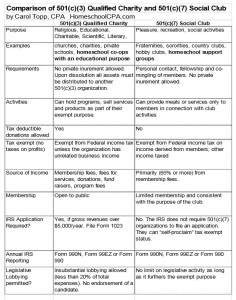From the Facebook group I Am a Homeschool Group Leader, came this question:
After much reading, I have come up with a question… What is the difference between a homeschool group and a homeschool co-op?
I took over the leadership of our local, small, informal, unincorporated homeschool group last year. We’re a group of families that meet for unstructured socialization/play time twice a month. We offer classes for all age groups, workshops for moms & dads, date nights/coffee nights for moms & dads, monthly field trips, monthly activity days, and even some on-going activity days. After reading Carol Topp’s book Homeschool Co-ops, and talking with the HSLDA support group liaison in regards to support groups, I am thinking that the group I am in charge of is a style of co-op. Is this right, wrong, both or neither?
-Jacquelyn
I make a differentiation between co-op and support groups because their tax exempt status is different in the eyes of the IRS.
Homeschool co-ops have an educational focus and qualify for 501(c)(3) status as educational organizations.
Homeschool support groups have social interaction and support as their focus and the IRS would classify them as 501(c)(7) Social Clubs.
Here’s an article explaining the differences. It includes a chart comparing 501(c)(3) (co-ops) and 501(c)(7) (support groups). Homeschool Groups As Social Clubs.
As homeschooling grows, I’ve seen support groups change into co-ops and co-ops add support activities. Things are not as clear cut as my chart make it seem! So when I consult with a group I ask about:
- their activities
- where do they spend their time and their money?
- what is the source of most of their income and expenses? (that’s how CPA’s think!)
From hearing about their activities and money, I can usually help discern if their group is a 501(c)(3) (educational co-op) or 501(c)(7) social club (support group).
It sounds like Jacquelyn’s group is a support group. Support groups fit the IRS 501c7 social club status and can “self declare” their tax exempt status without officially applying. (educational organizations with more than $5,000 annual gross revenues must apply for 501(c)(3) status).
But the IRS says all nonprofits-even small support groups- are supposed to be filing the annual Form 990N. Read more here: https://homeschoolcpa.com/irs-form-990n-faq/
For Jacquelyn’s group and hundreds like them, the tipping point comes when the group gets an EIN from the IRS to open a checking account. That’s then the IRS knows about your group and it will need to start filing the annual 990N (it’s online and only 8 question. it takes about 5 minutes once a year).
Important disclaimer: I stated that a co-op is a 501(c)(3) and a support group is a 501(c)(7), but that is my interpretation of the IRS tax code. You will not find homeschool groups mentioned in the IRS rules and regulations. (PTL!) I have discussed homeschool group classifications with IRS employees, read a ton and have attended workshops put on by the IRS. I’m a CPA and homeschooled for 14 years. I still belong to my support group, even though I retired from homeschooling 4 years ago. But I want to make it clear that I am using my CPA knowledge and homeschool experience to help homeschool organizations understand and comply with IRS regulations.
I hope that helps!
Carol Topp, CPA
P.S. Jacqueline found Homeschool Co-ops: How To Start Them, Run Them and Not Burn Out helpful.
Maybe you would, too.


